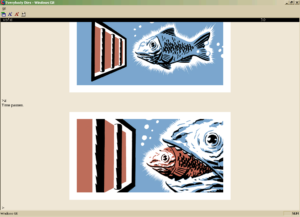IFComp 2008: Everybody Dies
A weird little story by novelist Jim Munroe. Spoilers follow the break.
It’s a little bit Photopia, a little bit All Roads, and a little bit Clerks. That is, it’s a railroady story game where the point is more to find out what’s going on than to figure out what to do, it’s got multiple PCs and scenes arranged out of order, and it’s all about death. Of malcontented retail workers.
I don’t always like railroady story games. In fact, I probably dislike most of those I’ve tried. It really all comes down to how good the writing is, and the writing is good here, very conversational in tone and conveying a lot of personality in just a few words. You play three different characters with their individual (yet similarly cynical) perspectives: the potty-mouthed heavy-metal slacker, the put-upon teen from a Sikh family, the long-suffering manager. All three die senseless deaths. But their spirits somehow go back in time, one by one, to help each other change it all.
 Not that you understand at first that that’s what’s happening. Each scene is followed by an enigmatic interlude involving illustrations of nested fish, which are also glimpsed in the game content, and which seem to be a symbol for what’s happening to the three souls. Indie-film quirkiness is what it is. These interludes are noninteractive, but in order to pace the pictures, they give the player a repeated command prompt to which no command other than “wait” is accepted, which was a little irksome. But the illustrations, by freelance illustrator/cartoonist Michael Cho, are excellent — very bold, with more shadows than outlines, using a poster-like minimal palette. He seems to do a lot of stuff like that, to judge by his works online. Cho also provides a portrait for each playable character as they’re introduced.
Not that you understand at first that that’s what’s happening. Each scene is followed by an enigmatic interlude involving illustrations of nested fish, which are also glimpsed in the game content, and which seem to be a symbol for what’s happening to the three souls. Indie-film quirkiness is what it is. These interludes are noninteractive, but in order to pace the pictures, they give the player a repeated command prompt to which no command other than “wait” is accepted, which was a little irksome. But the illustrations, by freelance illustrator/cartoonist Michael Cho, are excellent — very bold, with more shadows than outlines, using a poster-like minimal palette. He seems to do a lot of stuff like that, to judge by his works online. Cho also provides a portrait for each playable character as they’re introduced.
It’s a short piece, and I wish it had been longer, but that’s the way it goes for linear story-based games: if your time isn’t occupied with fiddling with puzzles, you can pretty much play through a work in the time it takes to read its prose. I noticed some bugs on replay — some small inconsistencies of perspective (Ranni can refer to “the night we threw the cart over the rail” despite not having been involved), a command or two that could be handled better (“push carts west” yields “Really, the only sensible thing to do to a cart train is to PUSH it.”) And this in a short game with eighteen credited beta testers, which should be a lesson in humility to us all.
One more thing: I had played Munroe’s entry in IFComp 2000, Punk Points, but didn’t know until I googled him just now that he’s a professional writer. Even after googling, I had suspicions that Jim Munroe, Novelist and Jim Munroe, IFComp Entrant probably weren’t the same person, but it turns out that they are. It shows something weird about the Comp, that it places people at extremely different levels of competence in direct competition with each other. A man who makes a living from his pen can have his work judged against that of any overconfident twelve-year-old who slapped together a half-functional game in an afternoon. I guess the IF world is too small to afford gradations.
Rating: 7
 Comments(0)
Comments(0)